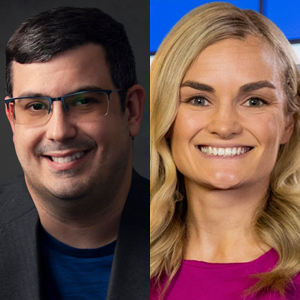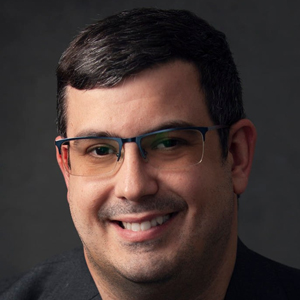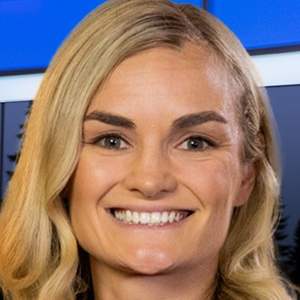
Young professionals are making their mark on broadcasting in Wisconsin and the WBA is recognizing them.
The WBA Young Professional of the Year Award seeks to recognize young broadcasters who have made a significant impact on their stations and communities. A subcommittee of the WBA Board of Directors selected five young professionals to recognize in 2023, and one of those five has been identified as the “Young Professional of the Year.”
Two honorees are profiled here. The three other honorees will be identified and profiled in and upcoming WBA newsletters and the Young Professional of the Year will be announced in the May/June newsletter and awarded at the WBA Summer Conference on June 20 at Hotel Retlaw in Fond du Lac.
Our first two honorees are Keith Heisler and Briggs LeSavage.

Company: Radio Plus Inc
Position: Program Director and IT Director
Years at station: 19
Started in broadcasting (year): 2004
How did you get into broadcasting? I’d wanted to be on the radio for as long as I can remember. In 6th grade when we were asked what we wanted to do when we “grew up” my answer was “I’m going to be on the radio.” When was a freshman in college, my aunt worked at the performing arts center in town and they had a weekly interview segment at the station at the time. She kept telling the program director about me and I think he gave me an interview as an intern just to get her to stop asking! I’ve been lucky enough to be here ever since.
How do you view the role of young professionals in broadcasting? We’re brand ambassadors, We’re the future of the industry. We’re the ones who need to ask questions and push for innovations. We’re the ones who need to challenge the system and continue to improve it. In addition to being some of the people who will keep our companies going strong, we’re the ones who are radio’s current and future audience members. We need to think about our audience whenever possible. It’s ok to put a name and face to those internal conversations because it helps you to connect.
What advice would you give to other young broadcasters? The most valuable gift a broadcast veteran can give you is their time. Don’t waste it. Ask questions, take notes, and be an active listener. Challenge yourself daily to continue to learn and try new things. One of my good friends and mentors in the industry always told me to “eat your frogs for breakfast” meaning do your toughest task first. I do that as much as possible because it allows me to be hyper focused on my most difficult daily challenge.
On a personal note, be present and active in your community. Do all you can to be an effective communicator. Regardless of your role, broadcasting is all about effective communication, brand building, and community engagement.
All that said, broadcast is wonderful but can stressful too. Take time for yourself to reflect and disengage when necessary. Most importantly, you are going to screw up and that’s ok! Give yourself the grace to learn from the missteps you’ve taken because they’ll make you better in the future.
What does the future of broadcasting look like to you? The future of broadcasting is constantly changing. We’re in a world of instant gratification. We need the people who want to engage with our content wherever they are at in whatever way it works best for them. We need to deliver relevant, personality-driven, locally-focused content to them as much as possible. We need to continue to engage in decision making that is relevant to the lives of those we’re trying to serve and we need to be good community partners and relationship builders.

Company: Northern News Now/Gray Television
Position: Managing Editor, 5 p.m. Co-Anchor, Lifestyle Show Co-Anchor
Years at station: 7.5
Started in broadcasting (year): 2014
How did you get into broadcasting? My interest in journalism stemmed from my time working for my high school’s student newspaper. I wrote an article about our school’s special education department and how the students were starting a “Cookie Club.” I interviewed a student named Sean for that piece. After the story published, his family was overcome with pride. They talked about how much it meant to Sean and their entire family to see his accomplishments highlighted like this. After that, I knew I wanted to make a difference by sharing people’s stories, especially those who may not often find themselves in the spotlight.
In college, I earned a communications and journalism degree from the University of St. Thomas in St. Paul. I started my career working in broadcast television after graduating. I have spent my entire broadcasting career working in the Duluth/Superior market, which is my hometown!
How do you view the role of young professionals in broadcasting? I see young professionals as a very important asset in the broadcasting industry. We bring a different perspective and can help guide the industry into a new age, something that is very important as news-consuming habits continue to evolve.
What advice would you give to other young broadcasters? I would suggest taking on every day with an open mind. The best part about this job is that almost every day we get to learn about something (or meet someone) we may have never had the opportunity to without this career. The more you can embrace the unknown and open your mind to learning, the happier you will be! Also, be curious!
If you are first starting out in your career and are wondering what position might suit you best, I would recommend starting as a producer. Some of our strongest reporters started in that role. It gave them the chance to see how the newsroom operates and what makes a good story before they headed out the door with a looming deadline (and likely a bundle of nerves!) It also gave them more time in the building to learn from our veteran anchors and newsroom staff, especially when it came to news judgement and storytelling.
What does the future of broadcasting look like to you? I see a lot of exciting changes ahead for the future of broadcasting. My station has seen the benefits of longer form reports (which we call targeted special reports, or TSRs) first-hand. We air them weekly on Thursday nights and they have driven viewership significantly. They are generally investigative-style stories or ones that take the viewers along for an experience. Basically, these stories are relevant content that they won’t be able to get anywhere else. Today, anyone can go online and get the latest headlines in a matter of minutes. So realizing what we can do to advance those stories in our newscasts is key.
I also see content like locally-produced lifestyle shows taking off dramatically. We recently started a similar show at our station and the viewers have really resonated with it. It’s another example of taking viewers along for an experience, as we often go out and show people the fun they can have right where they live. It’s also a great way to engage our audience and connect with them on a more personal level, which has helped us develop some loyal viewers. The more light-hearted show can help engage a younger audience, as it almost mimics the connection they feel to social media influencers (all while including a news-related element, of course!)



